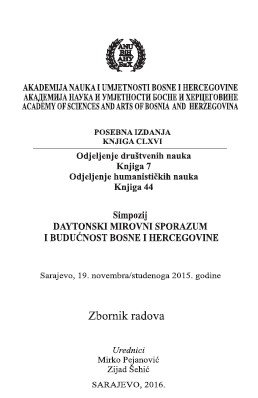NEKE PRETPOSTAVKE ZA BRISELSKU BOSNU I HERCEGOVINU
SOME ASSUMPTIONS FOR BRUSSELS’ BOSNIA AND HERZEGOVINA
Author(s): Omer Ibrahimagić
Subject(s): Constitutional Law, Human Rights and Humanitarian Law, Transformation Period (1990 - 2010), Present Times (2010 - today), EU-Approach / EU-Accession / EU-Development, EU-Legislation, Peace and Conflict Studies, Comparative Law
Published by: Akademija Nauka i Umjetnosti Bosne i Hercegovine
Keywords: Bosnia and Herzegovina; Dayton Agreement; ethnocracy; antitocracy; democracy; pre-election party coalitions; harmonization of Constitution of BiH with the European convention on human rights;
Summary/Abstract: This paper discusses the process of accession of Bosnia and Herzegovina to the European Union and the Euro-Atlantic security system at a time when Bosnia and Herzegovina’s state structure is regulated under the Dayton Agreement, according to which the main pillar of the political order is the rule of three ethnic groups instead of citizens, which therefore instead of democracy introduced the rule of ethnocracy. The consequence is that even 20 years after Dayton Bosnia and Herzegovina is still not a functional state, because the entities created by ethnicity (Serbs in the Republika Srpska, Bosniaks and Croats in the Federation of BiH) have become self-sufficient (entitocracy) and disinterested in the creation of a single state policy. Therefore, BiH has no strategy of socio-economic development and lags behind in meeting the requirements for joining the European Union, for which two-thirds majority of its citizens have voted. This paper offers proposals whose adoption would achieve at least some assumptions to accelerate the process of transition of Bosnia and Herzegovina from Dayton (chained with ethnicities and entities) into Brussels (dynamic-civil) phase of its EU accession.
Book: DAYTONSKI MIROVNI SPORAZUM I BUDUĆNOST BOSNE I HERCEGOVINE
- Page Range: 177-184
- Page Count: 8
- Publication Year: 2015
- Language: Bosnian, Croatian, Serbian
- Content File-PDF

